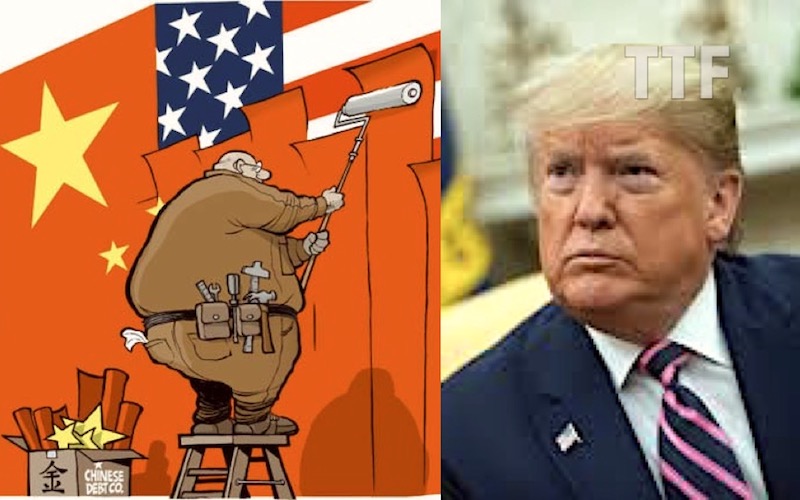
“The pandemic is going to damage the American and British economy beyond repair, to a point that the British may slip back into their ‘colonial’ mindsets, determined to break the Chinese monopoly on trade by waging a world war together with the US. It’s not too far-fetched, if you think about it”
Raggie Jessy Rithaudeen
#تتفچوۏيد19: چوۏيد-19 بوليه چتوس ڤراڠ دنيا كتيڬ
#TTFCovid19
The Covid-19 causing Coronavirus pandemic has exposed the world to risk factors that were there all along there but have never been taken seriously.
For centuries, people have been travelling vast distances across oceans, spending months at a time at sea to trade goods.
After having established the city of Malacca, Parameswara, its first ruler, laid foundations for a trade entrepot that quickly became known throughout the western world as a centre of trade and commerce.
In 1405, a special envoy led by Yin Qing, sent by Emperor Yongle of the Ming Dynasty, paved the way for the establishment of friendly relations between Malacca and China.
Two years later, the legendary Admiral Zheng made his first visit to Malacca and returned to the state five times in the years that followed.
This led to Chinese merchants frequenting the Malacca port and pioneering the establishment of foreign trading bases there.
Other foreign traders soon followed suit, notably the Arabs, Indians and Persians, some of whom chose to settle in Malacca, soaring its population to 2000.
Things were good, as these traders were focused solely on trade, not conquest. But then came the English.
On the 31stof December 1600, the Queen of England, Elizabeth I, granted a Royal Charter to “George, Earl of Cumberland, and 215 Knights, Aldermenand Burgesses” under the name Governor and Company of Merchants of London trading with the East Indies.
This led to the establishment of the East India Company (EIC) – known also as the Honourable East India Company (HEIC), or simply, The Company – to trade in the Indian Ocean region.
The Company began trading with the Moghuls of India and the East Indies and later went on to trade with Qing China.
The company ended up seizing large parts of the Indian subcontinent and colonised parts of Southeast Asia and Hong Kong after the First Opium War.
So you see, for the English, the need to move across oceans to trade was always accompanied by conquests, often leading to colonization.
In the case of The Company, the mission began with the need to deliver a decisive blow to the Spanish and Portuguese monopoly of Far Eastern Trade.
It’s much the same today, the only difference being, you don’t get English, American or even Russian ships preying on ships belonging to lesser powers in the middle of the ocean.
Instead, we have a multitude of maritime and trade laws, where power is no longer exerted by one nation over another through the barrels of guns or canons, but the might of one’s currency against another’s and the ability for one to “produce and buy more for less.”
It has always been about globalization, or “the process by which businesses or other organizations develop international influence or start operating on an international scale.”
The only difference is the magnitude, speed and means of the process, which, in this day and time, is denominated by the willingness of sovereigns to enter into global treaties and agreements.
These agreements help put normalised definitions to a broad spectrum of details, doing away with differences in laws and norms that otherwise pose hurdles to cross-border trade.
When almost everyone is bound by the same set of rules, business becomes a ‘localised’ affair, akin to one country having hundreds of companies trading with each other within its borders.
If you have the strongest currency, the most reserves, better liquidity and can offer or even buy much more with much less money, you’re likely to be a driver of the globalised supply chain.
That’s colonisation today, and essentially a dominating factor in modern day globalisation. But that may all come to an abrupt end.
For Prof Richard Portes, professor of economics at London Business School, it seems obvious that things will have to change, because firms and people have now realised what risks they had been taking.
“Look at trade,” he explains. “Once supply chains were disrupted (by coronavirus), people started looking for alternative suppliers at home, even if they were more expensive.
“If people find domestic suppliers, they will stick with them… because of those perceived risks.”
Another professor seems to agree, and believes that a combination of factors will mean the Western manufacturing industry will start bringing work back home, or re-shoring it, as it is called.
“I think that the trade war (mainly between the US and China), combined with the Coronavirus epidemic, will lead companies to actually take re-shoring seriously,” she says.
“They will re-shore activities that can be automated, because re-shoring brings certainty. You do not have to worry about your national trade policy, and it also gives you an opportunity to diversify your supplier base.”
That having been said, globalisation is not only about moving manufactured goods around the world, but moving people, ideas and information, something that the English have always been very good at.
As David Henig, director of the UK Trade Policy Project at the European Centre for International Political Economy, points out, “The service sector must have fallen off a cliff, and just look (in particular) at tourism and universities.
“There must be real concern about the number of new entries to Western universities this autumn. This is a huge export industry… many universities are dependent on Chinese students, for example.”
And he’s right – slowing or even reversing globalisation would hit western industries very hard and could lead to something very ugly – like a world war.
On the 29thof March 2020, I wrote:
“The Chinese may be so self-sufficient with domestic demands in the coming months that the temporary drop in exports won’t exactly keep the economy from bouncing.
“As a matter of fact, as the American dollar weakens and as the Great Depression-styled downturn happens in the US, investors are bound to shift their gaze towards China and other Asian economies, such as Malaysia, which seems to have weathered the Covid-19 pandemic well.
“This would inevitably result in a new cluster of “emerging markets” pivoting their economies on Chinese trade to bolster market confidence and reduce the risk of liquidity stress, funding difficulties and downward pressure on share prices.
“As it is, investors are already pleased with the ‘draconian’ restriction measures taken by Malaysia and several Asian countries to contain the pandemic, causing the Ringgit to register gains against the US Dollar.
“It is highly likely that China, which already is the world’s fastest growing economy and currently ranks as the largest in terms of purchasing power parity, will emerge as the world’s new economic superpower by year end.”
If Prof Richard Portes is right, when Americans start looking for alternative suppliers at home, they’re going to find it a hell of a lot more expensive, what with supply plunging to an all-time low and all.
The more the US and the UK look home, the lesser will be the significance of global treaties, agreements and rules to them.
The Chinese, on the other hand, have always been dependent on their own suppliers, who’re probably going to double efforts for less money to bounce the economy back.
Like I said, this will all result in a new cluster of “emerging markets” pivoting their economies on Chinese trade to bolster market confidence and reduce the risk of liquidity stress, funding difficulties and downward pressure on share prices.
And that’s going to damage the American and British economy beyond repair, to a point that the British may slip back into their ‘colonising’ mindsets, determined to break the Chinese monopoly on trade by waging a world war together with the US.
It’s not too far-fetched, if you think about it.



